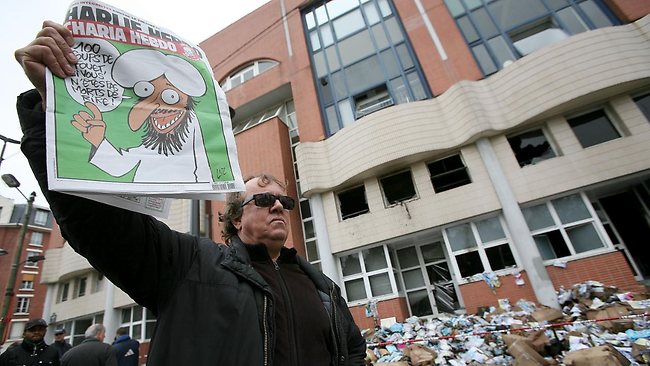The New Charlie Hebdo cover
The new Charlie Hebdo cover

NEW DELHI: French satirical magazine Charlie Hebdo -- the offices of which were attacked by gunmen leading to the death of 12 people including its editor and celebrated cartoonists -- is due to publish a cartoon of the Prophet Muhammad in its first issue since the attack.
More than three million copies of this latest edition will be printed -- 50 times the usual number.
The newspaper Liberation -- which hosted the Charlie Hebdo staff as they prepared the new issue -- published an image of the new cover late on Monday night. The image shows a man in a white turban holding a sign reading “Je Suis Charlie” -- a slogan that has become symbolic with the movement.
The magazine’s decision to print a cartoon of Prophet Muhammad in its first issue since the attack is important given that the attack itself seems to be linked to this. Brothers Cherif and Said Kouachi and their friend, Amedy Coulibaly, who were behind the attack, reportedly shouted "We have avenged the Prophet Muhammad" and "God is Great" in Arabic ("Allahu Akbar") as they stormed the magazine’s offices. The magazine has courted controversy in the past for its irreverent take on news and current affairs. In November 2011, the magazine’s officer were firebombed after it published caricatures depicting the Prophet Muhammad.
The magazine has also published cartoons pertaining to other religions, but in 2012, the magazine received threats after it published a series of satirical cartoons of Prophet Muhammad, some of which depicted the Prophet in the nude.
The French government tried to pressure the magazine’s editor to not go through with the publication of the cartoons, and beefed up security at several embassies as well as closed embassies, schools and cultural centres in 20 countries when the editors decided to go ahead with publication.
The publication of the cartoons came on the heels of attacks on US embassies in the Middle East, purportedly in response to the anti-Islamic film “Innocence of Muslims.” When the magazine decided to go ahead with the publication of the cartoons, given the context, French Foreign Minister Laurent Fabius criticised the move, saying, “In France, there is a principle of freedom of expression, which should not be undermined. In the present context, given this absurd video that has been aired, strong emotions have been awakened in many Muslim countries. Is it really sensible or intelligent to pour oil on the fire?"
The magazine’s editors, however, defended their decision, saying, “We do caricatures of everyone, and above all every week, and when we do it with the Prophet, it's called provocation."
In reference to the new cover, Charlie Hebdo's lawyer Richard Malka told France Info radio: "We will not give in. The spirit of 'I am Charlie' means the right to blaspheme."
While the “Je Suis Charlie” slogan is being used to symbolise solidarity with the victims of the attack, many other have drawn attention to the problematic nature of “free speech.” Satire is meant to punch up, not down, and whilst the attack on Charlie Hebdo should be condemned in absolute terms, it should not be equated with being an attack on “free speech.”
The right to blaspheme, in fact, had come up as a right to target the Catholic Church -- a symbol of religious and political power, at the time-- and was therefore, a means of punching up. When turned against France’s discriminated against Muslim minority in today’s socio-economic context, many say that it violates the notion of responsibility inherent in the right to “free speech.”



